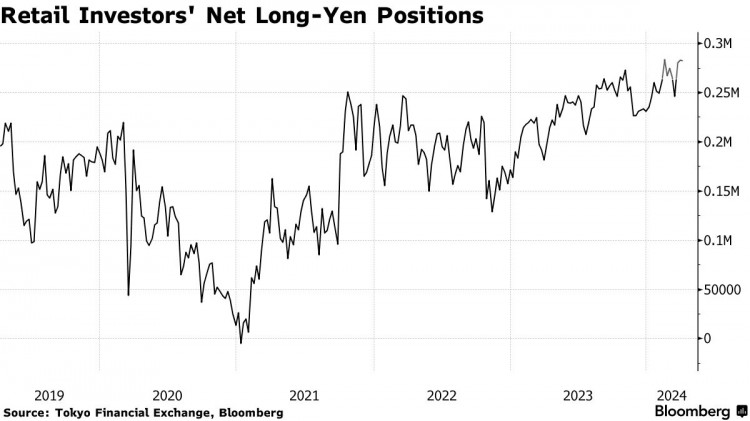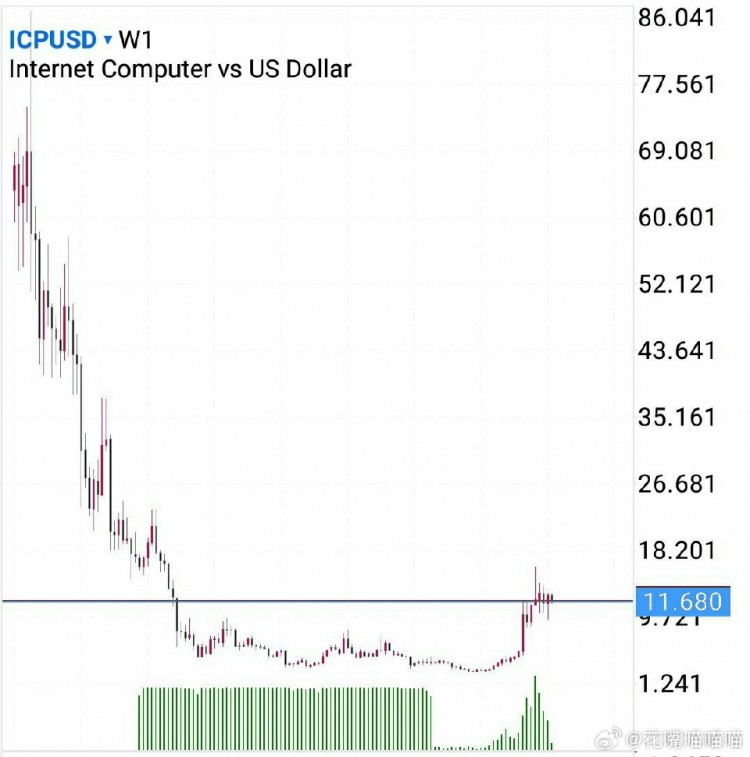时间:2024-04-10|浏览:309
With the yen trading near a 34-year low against the dollar, market participants are awaiting the upcoming U.S. CPI inflation data for March, which could push the yen below the next barrier, prompting Japanese authorities to intervene in the currency market. Tokyo's currency market is abuzz with speculation about possible intervention. One group is confident of this - domestic retail investors.
Unlike professional asset managers, which hold record short positions, Japanese retail investors are betting that the government will step in to push up the yen. In this scenario, the yen could quickly appreciate to 5 yen per dollar, according to market strategists. Their hopes are on Japan's Finance Minister Shunichi Suzuki, who has repeatedly warned that he is willing to address excessive yen volatility. With the exchange rate approaching the 152 level, there is speculation that a breach of this threshold would trigger intervention.
"Investors are taking bigger short dollar positions the closer they get to 152 yen, in anticipation of Japanese intervention," said Takuya Kanda, research director at Gaitame.com Research Institute.
Japan accounts for nearly 30% of global retail forex trading, according to data from the Bank of Japan. According to foreign exchange margin market data from Tokyo Financial Exchange Click 365, long yen positions held by Japanese retail investors were close to a record on April 2. This is in stark contrast to financial professionals. According to the latest data from the U.S. Commodity Futures Trading Commission (CFTC), the net short yen positions held by leveraged funds and asset managers rose to 148,388 contracts in the week ending April 2, the highest level since January 2007. Such investors have been selling the yen because they expect it to depreciate further due to the widening interest rate differential between the U.S. and Japan.

So far, the pros have been right. The yen has fallen about 7% against the dollar this year, becoming the weakest major currency. The Bank of Japan's first rate hike since 2007 failed to stem the decline. Japan's foreign exchange authorities have stepped up warnings against speculative trading. With the Bank of Japan setting its benchmark rate between 0 and 0.1%, the U.S.-Japan interest rate differential remains wide.
However, if the Japanese government chooses to act, it still has enough "ammunition". As of the end of February, Japan's foreign exchange reserves were $1.15 trillion. The Japanese Ministry of Finance only spent more than 9 trillion yen (59 billion U.S. dollars) in three interventions in September and October 2022. This makes some professionals who are shorting nervous.
"We are holding long dollar positions near 152 as clients are selling dollars," said Yoshio Iguchi, head of the market department at Traders Securities. He added that they are ready to cover those yen positions as soon as the exchange rate breaks through the 152 threshold. "We are afraid of currency intervention," he said.
In any case, the U.S. CPI data for March, due out late Wednesday, will be “a big test for the Japanese authorities.”
However, this timing is a bit special. Japanese Prime Minister Fumio Kishida is attending an economic and defense summit in the United States. Marc Chandler, chief market strategist at Bannockburn Global Forex in New York, said:
“With Japanese Prime Minister Fumio Kishida now in the U.S., I think the risk of intervention at this point is very low because it would be embarrassing if Japan intervened. The Fed has not cut rates yet, which means the Fed is more worried about inflation, but a strong dollar helps curb inflation. So if your allies (like Japan) are selling dollars and you want the dollar to be stronger, that could send conflicting messages.”
In the face of this, Bank of Japan Governor Kazuo Ueda brushed off market speculation that a sharp fall in the yen could force the central bank to raise interest rates, sticking with the central bank's standard rhetoric on the currency. He said the central bank would not make policy changes directly in response to exchange rate changes.
“We are not considering changing monetary policy at all to directly respond to foreign exchange fluctuations,” he said in response to questions in parliament on Wednesday. But he added that the central bank will continue to monitor the impact of a weak yen on economic and inflation dynamics.
Although foreign exchange intervention is decided by the Ministry of Finance, many Bank of Japan observers point out that if the yen falls further and the Ministry of Finance's intervention in the foreign exchange market fails to change the market trend, the central bank may consider raising interest rates early.
In his semi-annual report to parliament, Ueda also said the central bank would consider a policy shift if a weak yen spurred cost-push inflation, indirectly hampering a virtuous cycle of wages and inflation. "Uncertainty surrounding the economy is very high, and we need to pay close attention to financial and currency markets and their impact on the economy and inflation," he said.
Article forwarded from: Jinshi Data

用戶喜愛的交易所

已有账号登陆后会弹出下载









